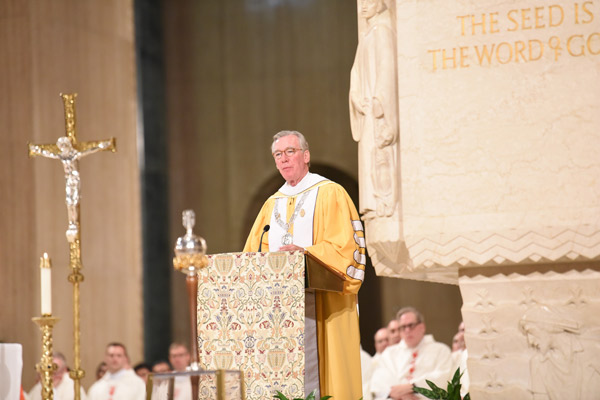
Remarks of President Garvey
Mass of the Holy Spirit
Upper Church, Basilica of the National Shrine of the Immaculate Conception
Aug. 30, 2018

Today we gather at the Mass of the Holy Spirit to mark the beginning of the academic year. The University has celebrated a mass like this every year since 1887, the year of our founding.
Traditions are beautiful things, though if they are ancient enough we may forget why they were begun. A mass like this, especially for those who have been around for a while, becomes routine.
But there’s nothing routine about this year. The crisis the Church is facing at this moment, caused by a series of events and revelations I don’t need to enumerate, makes this mass bigger than our academic year.
We all have questions we would like to have answered. I have some of my own. What failure of leadership in the Church allowed 300 priests in Pennsylvania to abuse some 1,000 children? Who knew what about the former Cardinal McCarrick, and when?
These are questions we carry in our hearts, and they weigh heavy. I don’t have many answers. But I would like to offer a reminder that the mass we celebrate today, invoking the help and intercession of the Holy Spirit, is certainly the most fitting — and perhaps useful — contribution we can offer to make things better.
Devotion to the Holy Spirit is a neglected thing. It’s easy to relate to the image of God the Father, and to Jesus Christ as God and man who laid down his life for our sins.
The Holy Spirit seems like a member of a different household. For Moses he is a burning bush. At the river Jordan he descends in the form of a dove. At Pentecost he is a rushing wind. St. Cyril of Jerusalem describes him as water. Less anthropomorphic images, but we get the sense that he is everywhere, bringing things to life.
For Blessed Elena Guerra, devotion to the Holy Spirit was a life mission. She’s not well known, which, in a way, is fitting. Her fave, the Holy Spirit, is the least well known member of the Trinity.
Blessed Elena lived in a time of great change in the Catholic Church. Born in 1835 in the Tuscan village of Lucca, she witnessed the turmoil as the Church slowly lost its temporal holdings. The last of them vanished in 1870 when the Kingdom of Italy invaded Rome, essentially holding Pope Pius IX prisoner. Pope Francis has had a difficult week, but Pio Nono would have traded places with him.
Elena’s spiritual mission after these events was to make the prayer “Come Holy Spirit” as popular as the Hail Mary. After years of promoting her devotion, Elena realized her efforts were going nowhere. She needed help. In fact, she needed the Pope’s help. By this time the Pope was Leo XIII, the founder of our University.
In 1895 Elena wrote her first letter to Pope Leo:
Three weeks later Leo XIII began to promote the Pentecost novena among the bishops.
In 1897, in response to further pleas, Pope Leo published Divinum Illud Munus (This Divine Gift), an encyclical on the Holy Spirit. In it he explained why we ought to invoke the help of the third person of the Blessed Trinity:
[E]ach one of us greatly needs His protection and His help. The more a man is deficient in wisdom, weak in strength, borne down with trouble, prone to sin, so ought he the more to fly to Him who is the never-ceasing fount of light, strength, consolation, and holiness.
I’d like to read that again, but replacing the phrase “each one of us” with “the leaders of the Church.”
The leaders of the Church greatly need His protection and His help. The more the leaders of the Church are deficient in wisdom, weak in strength, borne down with trouble, prone to sin, so ought they the more to fly to Him who is the never-ceasing fount of light, strength, consolation, and holiness.
I understand the range of emotions we are all experiencing these days. I understand wanting immediate answers. And I understand wanting to see a brighter day and a holier Church. There are things we can do to bring those things to pass. The Church needs lay help in rooting out abuse and preventing its recurrence, as Cardinal DiNardo has said.